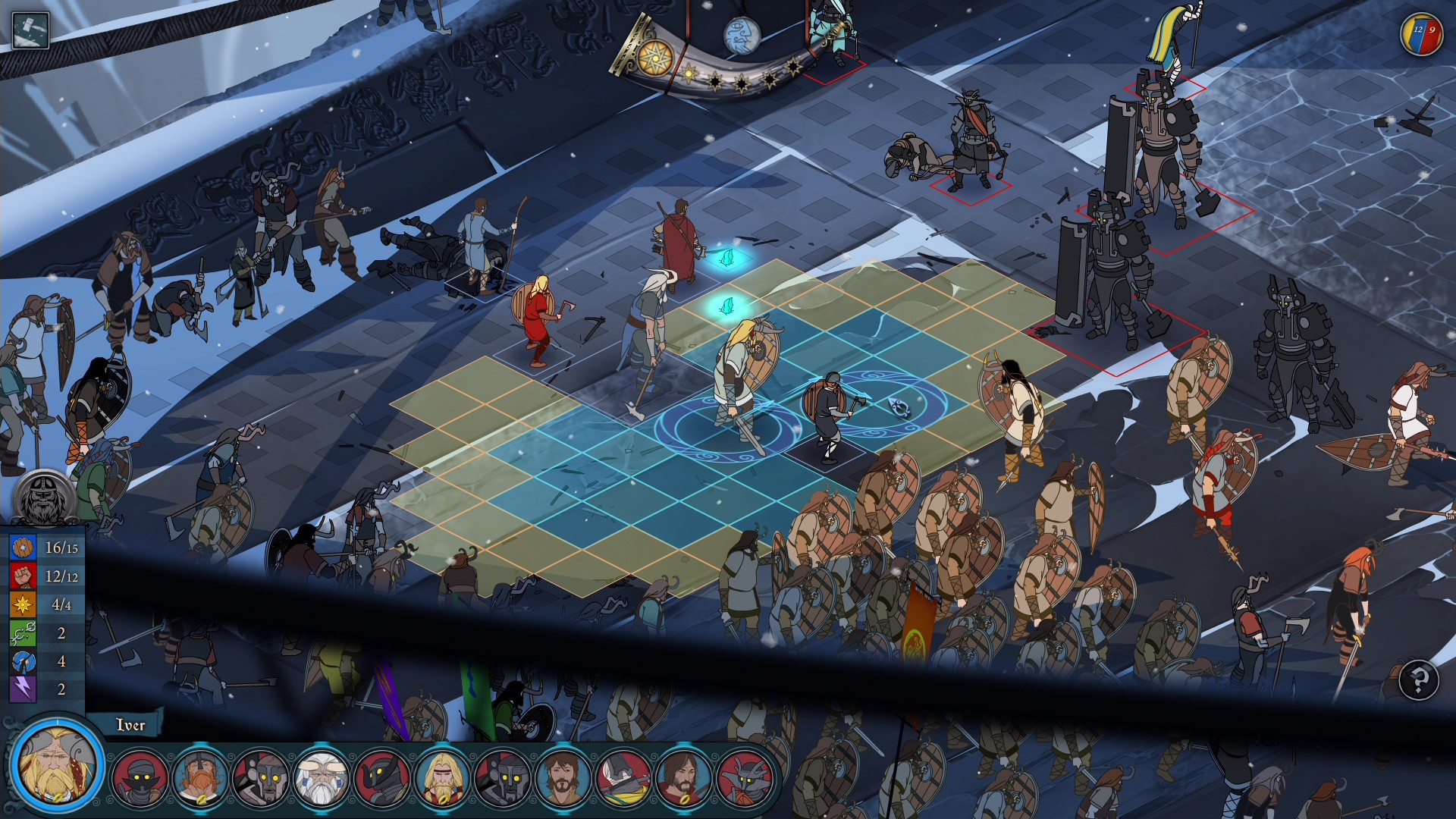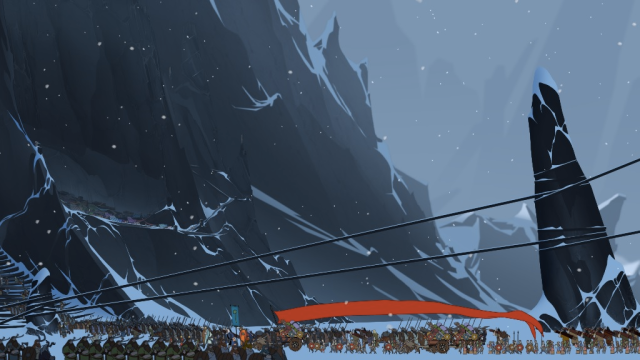Stoic Games is a tiny developer. While their Viking-inspired strategy game The Banner Saga became a hit, they didn’t have the bandwidth to port it themselves, so they found another studio to handle the game coming to PS4, Xbox One and Vita. Unfortunately, that studio went bankrupt.
Back in December, Stoic technical director John Watson announced the Vita port was going on the “back burner”.
“I have been excited about the Vita port since day one,” said Watson, “and I would love to see the Banner Saga running on my own Vita. The realities, however, of a very small team and a limited budget, put an immutable check on the speed of our progress.”
Stoic has only four full-time employees.
Though the developer said it would “consider” a Vita port in the future, after work had finished on The Banner Saga 2, it didn’t sound very promising at all.
The Banner Saga will be coming to Vita, though, because Sony stepped in. In fact, I’m told it’s coming this year. Here’s how that happened.
To find the right partner for The Banner Saga, Stoic had three different teams spend a week developing a prototype. After one showed more promise than the others, a deal was made for them to work on the PS4, Xbox One and Linux versions of the game. (Stoic has not released the name of this developer.)
Those versions were supposed to be finished in November 2014, but as we know now, they didn’t end come out until January 2016! The initial delays were due to “internal personnel turnover” but it was moving along — a playable version on PS4 was shown at Sony’s PlayStation Experience event in December 2014.
Soon after, the unnamed porting studio expanded and believed it could take on additional projects, leading Stoic to assign them a Vita version. The new deadline was July 2015, more than six months later after the original date.
Unfortunately, due once again to “personnel turnover”, the port fell behind. Worse still, in May 2015 developer went out of business. The ports were dead.
“That set us back quite a bit,” said Watson.

Because the company went out of business, the porting code wasn’t in a great state — it’s not as though the developers had left detailed notes on their work.
“Any time you’re using somebody else’s code,” said Watson, “it’s always going to be somewhat difficult. I always joke about programming code — whenever you encounter someone else’s code, it always sucks. Even if it’s your own code from two years ago. When it’s from past John it’s ‘who wrote this?!’ [laughs]”
And so the search began for a new porting studio.
“We scrambled around trying to find someone to pick it up,” said Waston.
That took a few months, but in August 2015 the ports were on-track again.
Things went much smoother this time, as evidenced by the ports being released. But when a company goes under, they don’t write you an apology check. Stoic was forced to pay a second porting company, effectively doubling the budget. The Vita version was even further behind, and Stoic was simply out of money.
“I try to help everyone understand how small our team is and how limited our resources are,” said Waston. “If something’s not happening at the speed that everyone would like, it’s not because of malice, it’s not because of lack of priority, it’s because we can only get so many things done. [laughs] We have to fund everything from existing revenue. I want to make a distinction between Stoic and a big game company with hoards and hoards of resources and manpower.”
Thus, the refreshingly honest blog where Watson explained how the Vita version might not actually happen.
What Stoic didn’t expect was the enormous response from its fans, which caught the attention of Sony.
“That Vita fanbase may not be massive but it is damn sure passionate,” said Gio Corsi, senior director of third party production and developer relations at Sony.
Sony knew The Banner Saga was having problems, and offered advice and recommendations for a new porting company for the console versions. When it seemed like the Vita version might not happen, they stepped in. Though Sony wouldn’t say specifics, they confirmed they’re financially supporting the port.
Thus, this announcement on Twitter a few weeks back:
Great news! We’re partnering with @vs_evil to continue work on #BannerSaga #Vita. More news in 2016. Happy Holidays! pic.twitter.com/txbawVDqpb
— Gio Corsi (@giocorsi) December 23, 2015
At the time, the paperwork hadn’t been formalised, so while everyone involved wanted to make the Vita version happen, there weren’t many details on how yet.
“[Vita] has its own host of challenges,” said Corsi. “I’m not gonna deny that, we all know that’s true! [laughs] But a lot of studios out there love working with the Vita or are excited by the technical challenge of working with the Vita. When we do a project, we always say ‘Are you open to doing a Vita version?’ and that’s usually met with a positive. People really love that platform — it’s the platform that could.”
In this case, the platform that could will be getting a very good strategy game.

Comments
5 responses to “How Sony Stopped A Vita Port From Being Canned”
This is excellent news, I’ll hold out for the VIta version now. Let’s hope sony are ready to keep the big games coming to vita.
I’m actually surprised it’s still going. Kudos to Sony for still supporting it this long.
Apparently worldwide sales of Vita surpassed 12 million last year. This combined with a lack of AAA competition on the platform means that lower-budget games can actually make a reasonable return. I also think the reason that Sony continues to provide half-hearted support is that it doesn’t have a successor in the works but it also doesn’t want to abandon the handheld market entirely.
That’s not too shabby but nowhere near 3DS levels of sales. I wonder if they will ever make another one. I don’t see it happening.
Not too shabby is about the best you can say about the Vita’s sales and software lineup. The biggest mistake Sony made was not getting system sellers on it. We’ll probably never know why Monster Hunter didn’t make an appearance but I suspect Nintendo bought exclusivity (which wouldn’t have been too expensive). Call of Duty was the other disappointment – whoever had oversight over Nihilistic’s shambolic game hopefully met the fate they deserved. Sony has poured a lot of money into the Vita’s software lineup, but unfortunately it just hasn’t produced the goods.
Sony gambled on producing a handheld that would fill the gap in the market left by Nintendo (i.e. AAA quality ‘adult’ games). Nintendo had and still has the kids’ market sewn up tight with its flagship franchises, plus the likes of Yokai Watch. Ironically, I think that Nintendo’s success has actually helped the Vita, because we’ve heard about Nintendo’s fairly rigid and unwieldy relationship with developers, and I think this has effectively driven a lot of them into the arms of Sony. Nintendo just isn’t in a space where it needs those indies, whereas Sony definitely is.